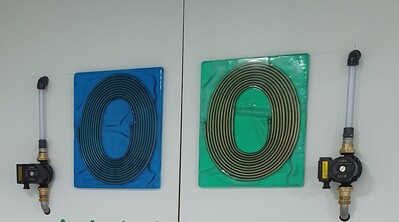Antifreeze top up for my heat pump - is this a rip off?
Posted by: @ecodan-efficiencysuspect you'll now tell me that's wrong without trying to understand the situation.
Posted by: @ecodan-efficiencynever mentioned Ethylene glycol
You didn't mention anything, except you didn't like my post.
You do as you wish, operate as you like, fill it as you wish. It's your system your money. If you don't like my answers don't read them, simple really.
I just say as it is, based on 4 years experience running low temperature heating system. And the many changes I had to make after install, to get it to run well and not cost a fortune to run. Running costs are half what they were in the first few months of running.
Original system design (buffer and multiple zones, mixer and pump on UFH manifold ) was based on discussion on forums and on many flawed assumptions that frequently come up on forums such as this. I have had buffer, volumiser, multiple thermostats, self balancing valves etc etc. all of which are now in a box on the loft or in the garage,. They are in general bad for efficiency and running costs, as is glycol in any form
I do know my circulation flow rate is way higher after removing anti freeze, also flow temp was lowered. So heat pump is happier, circulation pump also pulls less watts. I do know a fully open loop system works very well, if on a flat tariff WC is the way to go for cheap heating, not so true on a variable tariff without some modification to running temperature or two offset WC curves. I do know you can keep a stable house temp by just batch charging the floor (if you have enough depth of screed). All are good strategies.
All options have been tested and have evaluated the data recorded.
As said, just ignore my posts if you don't like them. Do what ever you feel you need to do.
Hi guys, let’s keep this thread focused and constructive, please.
There’s clearly a lot of passion and valuable experience on both sides of this discussion, and that’s a good thing. This forum exists so we can share different perspectives and help homeowners and installers make better-informed decisions. There’s no one-size-fits-all answer, especially with heat pump setups, so some disagreement is inevitable.
That said, I’m drawing a line here. I’ll delete any further bickering or off-topic jabs. Challenge ideas all you like, but please leave the personal digs out of it.
Get a copy of The Ultimate Guide to Heat Pumps
Subscribe and follow our YouTube channel!
@johnmo You are correct, standard Ethylene glycol used in the motor industry is highly toxic, however, the product used for heat pumps is a detoxified version and is completely harmless. I do not use it in air-source systems but do use it in ground-source systems as the viscosity is very much lower and specific heat capacity is higher than propylene glycol. The difference in performance between propelling glycol (the commonly available product mentioned above) and water is significant. In a real-life demonstration when I ran my training center, showed that to transfer the same amount of heat in an ethylene glycol medium mixed to -10 concentration required nearly 4 times the pumping energy as water. Hence the reason I do not use glycol unless where absolutely necessary.
Below is a picture of the demonstration rig I built, it was connected to a PLC that measured the flow rate and pressure drop, energy consumption and delivery of the 2 mediums.
I don't doubt your findings but the energy required to operate the pump is a still a tiny fraction of the power consumed - even with glycol added.
@ecodan-efficiency If you consider £200.00 to £300.00 a year, inconsiderate for a 10 kw system, then maybe, I do not consider that insignificant. Depending on the concentration of the glycol, you may need 150 to 300 watts more to do the same job as a water based system.
Posted by: @ecodan-efficiencyI don't doubt your findings but the energy required to operate the pump is a still a tiny fraction of the power consumed - even with glycol added.
Posted by: @heacol@ecodan-efficiency If you consider £200.00 to £300.00 a year, inconsiderate for a 10 kw system, then maybe, I do not consider that insignificant. Depending on the concentration of the glycol, you may need 150 to 300 watts more to do the same job as a water based system.
Since you're each focusing on a different measure both of you can be (and probably are) right.
The extra pumping energy needed is quite likely only a small proportion of the overall power consumed but given the scales the cost of that extra pumping energy amounts to a yearly amount most of us would consider significant.
As for whether that extra yearly cost is worth spending is then based on the cost of not doing it; if the risk of not adding glycol introduces a large risk of expensive freeze damage, I suspect most of us would consider £200 a reasonable insurance cost. If the design of the system makes the risk of freeze damage highly unlikely then that £200 is probably an unnecessary expense.
105 m2 bungalow in South East England
Mitsubishi Ecodan 8.5 kW air source heat pump
18 x 360W solar panels
1 x 6 kW GroWatt battery and SPH5000 inverter
1 x Myenergi Zappi
1 x VW ID3
Raised beds for home-grown veg and chickens for eggs
"Semper in excretia; sumus solum profundum variat"
@majordennisbloodnok I have never installed antifreeze valves or glycol and have never had any damage to any of my customers installations due to frosting, In reality, the only component that is going to be damaged is the pump, and most will be around the £200.00 mark to replace if very unlucky. Some will say the heat exchanger will be damaged, this I despite this, in the ground source world we often freeze the heat exchangers with Glycol in them when commissioning, and again, I have never had any damage.
There may be a risk, but in my view, it is negligible and worth taking. The additional installation cost to correctly install a system with Glycol will be significant as the internal pump that comes with the heat pump will, in almost all cases, be significantly too small (probably 4 times larger with a cost in to the thousands), possibly one of the reasons manufacturers like buffers and separation.
Thank you everyone for your help. I have received a quote for £300+ for the draining and refilling. Judging from the comments this probably isn’t great value. I am seeking another quote and will send what happens!
Posted by: @heacol@majordennisbloodnok I have never installed antifreeze valves or glycol and have never had any damage to any of my customers installations due to frosting, In reality, the only component that is going to be damaged is the pump, and most will be around the £200.00 mark to replace if very unlucky. Some will say the heat exchanger will be damaged, this I despite this, in the ground source world we often freeze the heat exchangers with Glycol in them when commissioning, and again, I have never had any damage.
There may be a risk, but in my view, it is negligible and worth taking. The additional installation cost to correctly install a system with Glycol will be significant as the internal pump that comes with the heat pump will, in almost all cases, be significantly too small (probably 4 times larger with a cost in to the thousands), possibly one of the reasons manufacturers like buffers and separation.
Agreed.
And since, as a system designer, you have a certain liability for what you deliver, the reasoning behind your viewpoint carries weight. As I said in my earlier post...
Posted by: @majordennisbloodnok...
If the design of the system makes the risk of freeze damage highly unlikely then that £200 is probably an unnecessary expense.
105 m2 bungalow in South East England
Mitsubishi Ecodan 8.5 kW air source heat pump
18 x 360W solar panels
1 x 6 kW GroWatt battery and SPH5000 inverter
1 x Myenergi Zappi
1 x VW ID3
Raised beds for home-grown veg and chickens for eggs
"Semper in excretia; sumus solum profundum variat"
@sallyl That sounds about right if they are re-filling with glycol, personally I would fill it with water, if you are worried, I would get them to install an antifreeze valve on the lower heat pump connection and just fill with water. That will maintain the warranty.
For the record, Grant supply ethylene glycol for their heat pumps:
Grant Inhib03 Heat Pump Fluid (Heat Pump Concentrate) - MSDS:
So if it's a Grant system it's highly likely it's been used.
- 27 Forums
- 2,520 Topics
- 58.6 K Posts
- 472 Online
- 6,800 Members
Join Us!
Worth Watching
Latest Posts
-
RE: Testing new controls/monitoring for Midea Clone ASHP
Now seems a good time to summarise the costs and effici...
By benson , 4 minutes ago
-

RE: Heat Pump vs New Gas Boiler for Inherited House - Worth the Extra Cost?
*** I now see @jamespa has already posted but will stil...
By cathodeRay , 1 hour ago
-

RE: Tell us about your Solar (PV) setup
@mk4 Charge to 100%, discharge down to 10%.
By bobflux , 1 hour ago
-

RE: Daikin Altherma 3 LT compressor longevity question
This mess is intriguing: I wonder if this represent...
By bobflux , 3 hours ago
-
RE: Connecting Growatt SPH5000 over wired ethernet rather than wireless
The simplest wired option is usually the Growatt Ethern...
By Jonatan , 7 hours ago
-

RE: Peak Energy Products V therm 16kW unit heat pump not reaching flow temperature
ASHPs do have a minimum compressor speed. The minimum h...
By bobflux , 14 hours ago
-

RE: Electricity price predictions
@jamespa And it seems some of the nasty public cloud...
By Batpred , 14 hours ago
-

RE: Jokes and fun posts about heat pumps and renewables
Technology is rapidly advancing. BBC News reported th...
By Transparent , 17 hours ago
-

What matters for flow and pressure drop is internal dia...
By bobflux , 18 hours ago
-

RE: Do Fridges and Freezers have COP ratings?
@editor Thank you all for your replies and submitted in...
By Toodles , 20 hours ago
-

I know and yes. The secondary deltaT wont necessaril...
By JamesPa , 1 day ago
-

RE: Designing heating system with air to water heat pump in France, near Lyon
Just love the way you put it! 🤣
By Batpred , 2 days ago
-

RE: Safety update; RCBOs supplying inverters or storage batteries
Thank you for sharing. So it seems that your Schneid...
By Batpred , 2 days ago
-

RE: Forum updates, announcements & issues
@upnorthandpersonal thanks for the thoughtful, consider...
By Mars , 2 days ago
-

RE: Solar Power Output – Let’s Compare Generation Figures
@mk4 All 21 panels have their own Enphase IQ7a microinv...
By Toodles , 2 days ago
-
RE: Setback savings - fact or fiction?
Great, so you have proven that MELCloud is consistently...
By RobS , 3 days ago
-
RE: Mitsu PUHZ120Y 'Outdoor Temp 'error?
Thanks David & James It almos...
By DavidAlgarve , 3 days ago
-

RE: Surge protection devices SPDs
@trebor12345 - your original Topic about the right type...
By Transparent , 3 days ago
-

RE: Help needed with Samsung AE120RXYDEG
@tomf I’ve been sent this from a service engineer at Sa...
By Mars , 3 days ago
-

RE: Buying large amp bidirectional RCD and RCBO
Yes... I went through this particular headache and ende...
By bobflux , 4 days ago
-

O-oh! Let's take this as an opportunity to 'pass the ...
By Transparent , 4 days ago
-

RE: Homely setup on daikin heat pump
@craigh I refer to our somewhat elevated temperature of...
By Toodles , 4 days ago
-

RE: Air source heat pump roll call – what heat pump brand and model do you have?
My turn, this describes the future installation, only t...
By bobflux , 4 days ago





